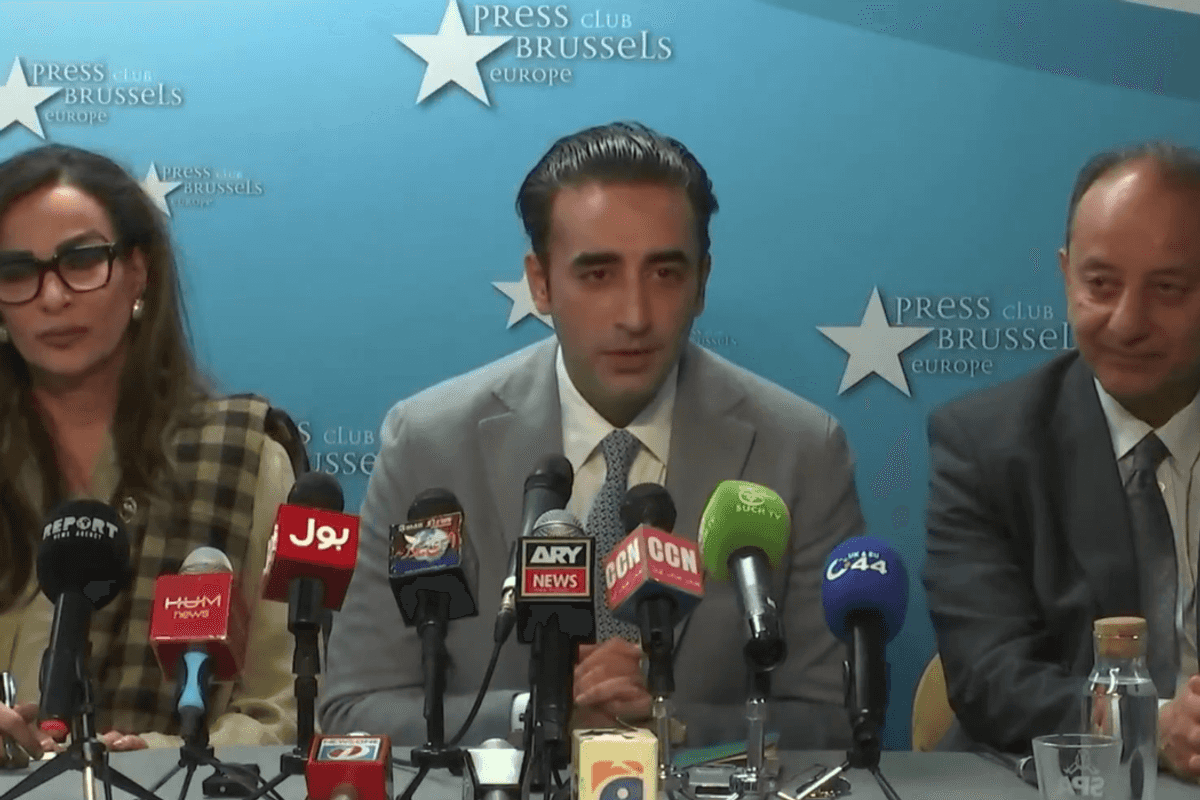Iran conflict must not turn into Iraq 2.0 or trigger WWIII, says Pakistan politician
Bilawal emphasized Pakistan’s longstanding commitment to regional peace and stressed the urgent need to prevent further escalation.
News Desk
The News Desk provides timely and factual coverage of national and international events, with an emphasis on accuracy and clarity.

Bilawal emphasized that Islamabad remains committed to achieving lasting peace in South Asia through comprehensive and sustained dialogue.
Screengrab
Pakistan’s former foreign minister Bilawal Bhutto Zardari on Saturday cautioned against the growing military conflict between Iran and Israel, warning that Pakistan cannot afford for Iran to become Iraq 2.0 or a flashpoint for World War III.
Speaking at the European Press Club in Brussels, Bilawal emphasized Pakistan’s longstanding commitment to regional peace and stressed the urgent need to prevent further escalation.
“We will continue to advocate for peace on all our borders. Be it with Afghanistan, be it with Iran, be it with India. We absolutely cannot afford this conflict in Iran to turn into Iraq 2.0 or World War III.”
The comments came amid a sharp spike in hostilities between Tehran and Tel Aviv. A day after Israel launched a sweeping air offensive targeting Iranian commanders, scientists, and nuclear infrastructure, both countries exchanged missile attacks in a dramatic escalation of tensions. The Israeli government has framed the strikes as a preemptive move to halt Iran’s nuclear ambitions.
U.S. President Donald Trump praised Israel’s military action, warning of even harsher consequences if Iran does not accept Washington’s demands to sharply curb its nuclear program -- talks over which were due to resume Sunday.
With Israel indicating its operations could stretch on for weeks, and encouraging Iranians to rise against their government, concerns are mounting over the potential for a broader regional war with global ramifications.
Addressing the unfolding crisis, Bilawal urged the international community to intervene immediately. “We need an urgent ceasefire in the conflict involving Iran and the occupying forces in Palestine,” he said, linking the flare-up to broader instability across the Middle East.
“We cannot allow perpetual war to become the norm,” he added. “This endless cycle of violence benefits no one.”
He added: “We will always stand for peace on all borders,” he said, “but it’s becoming far too easy to slip into war. It has started to feel like the default response to any dispute.”
Calls for restraint with India
Turning to rising tensions with India, Bilawal reiterated Pakistan’s commitment to peace, emphasizing that war is not a solution to any dispute. He revealed that following the recent flare-up along the eastern border, Prime Minister Shehbaz Sharif has constituted a diplomatic delegation tasked with informing the international community about India’s aggressive posture.
“India is using water as a weapon,” Bilawal warned, calling New Delhi’s threat to cut off river access an alarming provocation. “At a time when Pakistan is already confronting the devastating effects of climate change, such measures amount to environmental warfare,” he added.
Despite being a nuclear-armed nation, Pakistan has pursued restraint and repeatedly offered dialogue, Bilawal said, but India continues to reject negotiations. “We proposed an impartial investigation into the Pahalgam incident and remain open to discussing all outstanding issues, including Kashmir, through diplomacy,” he said.
“There is no military solution to the Kashmir dispute -- or to any conflict, including terrorism,” he stressed. Bilawal emphasized that Islamabad remains committed to achieving lasting peace in South Asia through comprehensive and sustained dialogue.
He acknowledged the fragility of the current ceasefire, noting that despite public expectations for de-escalation, India has continued to take provocative actions. “Even during the ceasefire, tensions have not eased. India’s conduct has been inflammatory and counterproductive to regional stability,” he said.
Bilawal also underscored the unprecedented risk posed by tensions between two nuclear states. “History has never witnessed a full-scale war between two nuclear powers,” he remarked, calling for urgent diplomatic engagement before miscalculation leads to catastrophe.
Pakistan, he said, has consistently extended an open hand for talks, while India’s repeated refusals reflect a pattern of hostility. “Rather than de-escalating tensions, the Indian leadership -- including the prime minister -- has chosen to fuel them with confrontational rhetoric,” he said.
While welcoming international mediation in principle, Bilawal maintained that only comprehensive and sincere negotiations could lead to a lasting resolution. “The world must recognize that dialogue is the only path to peace,” he added.
Bilawal recently wrapped up a five-day diplomatic mission to the United States, where he led a high-level Pakistani delegation in efforts to rally international support following renewed hostilities between Pakistan and India. The delegation is continuing its outreach abroad as part of a broader strategy to strengthen global diplomatic engagement.







Comments
See what people are discussing